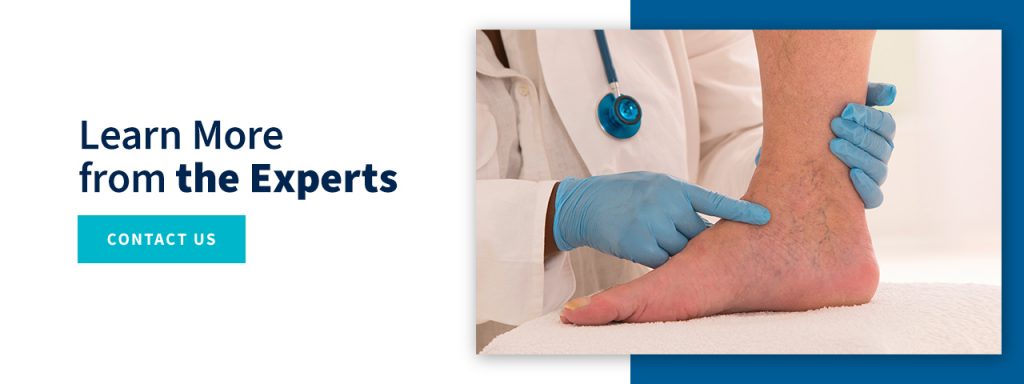
When we think of poor blood circulation, it’s easy to just focus on vein health. The reason why is understandable: varicose veins are common. While it’s still important to consider your venous health and see a vascular physician to treat any problems, we shouldn’t forget the impact that poor circulation has on our overall health. Here are just a few ways that poor circulation can wreak havoc on the body.
Many people are familiar with these dark, bulging veins. They are visible under the skin and can often make your legs feel painful, itchy, heavy, or tired. This is because poor circulation can cause blood to pool in the legs, which is where veins struggle the most to push blood upwards against the flow of gravity, resulting in a varicose vein. These can cause other problems when left untreated, including ulcers and blood clots.
Poor circulation — and untreated varicose veins — can lead to ulcers appearing on the skin. Excess blood in the vein can break down the vein wall, causing an ulcer to appear. Fortunately, treatment is quick, minimally invasive, and if done by a vein professional, is often covered by insurance. It’s easy to treat varicose veins before an ulcer has the opportunity to form.
Blood flow is directly related to brain activity. If you find that you’re experiencing an abnormal amount of brain fog, despite eating well and sleeping enough, poor circulation could be the culprit. When blood flow slows down, so does your ability to think properly, affecting your memory and ability to focus. Don’t reach for coffee to jumpstart your brain! Go straight to the source and seek treatment for your circulation.
Poor circulation also prevents kidneys from properly processing excess fluids. And if your kidneys can’t do their job, fluid accumulation can occur. In this case, they wind up finding a new home in your hands and feet. If you suddenly experience uncomfortable swelling in these extremities, then poor blood circulation may be to blame.
Most of us don’t think much about how circulation affects our hair, but because your blood is responsible for transporting nutrients throughout your body, your hair is dependent on good circulation. If your blood isn’t circulating properly, then parts of your body won’t receive the necessary nutrition. This is most commonly seen in areas furthest away from your heart, including the hair on your head.
Does circulation affect your stomach’s ability to process food? You bet it can. Similar to how slow circulation can cause slow thinking, it can also slow down your digestive system. This can lead to a myriad of uncomfortable digestive issues, including constipation.
On top of all these other symptoms, you’re also more likely to get sick. When your blood isn’t circulating properly, your immune system loses some of its ability to fight off germs. Let’s face it — most of us don’t have the time to recover from being sick, so it’s better to maintain healthy circulation.

When you’re seeking treatment for any health concern, you always want to see a specialist with a deep understanding of how to help. If your problem is venous insufficiency due to poor circulation, you need to see a knowledgeable, experienced vein specialist. Our staff at Central Florida Vein & Vascular Center have been offering quality treatment to patients in Central Florida for over a decade.
Poor circulation may effect vein health, among many other problems, but the vascular physicians in Orlando at Central Florida Vein & Vascular Center are here to help. You can schedule a consultation today. Our specialists will assess the current state of your vein health so that we can put together a treatment plan that works best for you. Every step of the way, we’ll make sure that you have a full understanding of your vein care plan — and how to continue having happy, healthy veins. And if you want to learn more about vein care and how to keep your veins in top shape, you can visit our blog for more information.